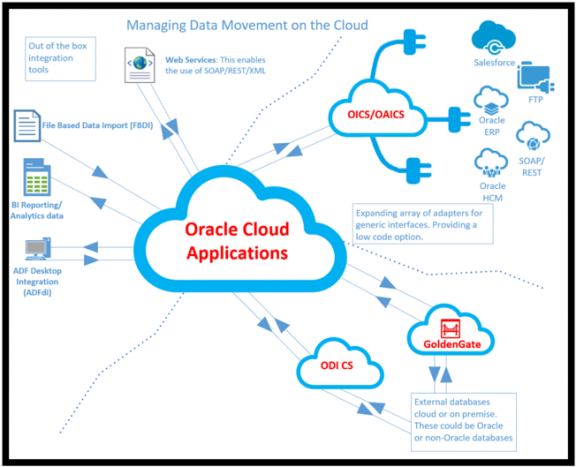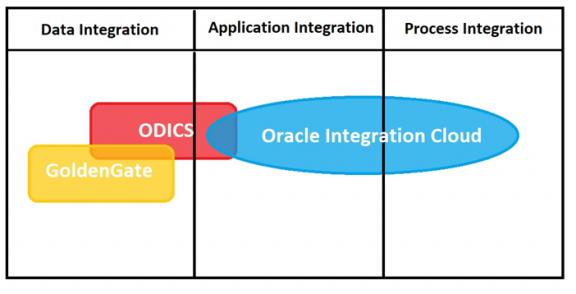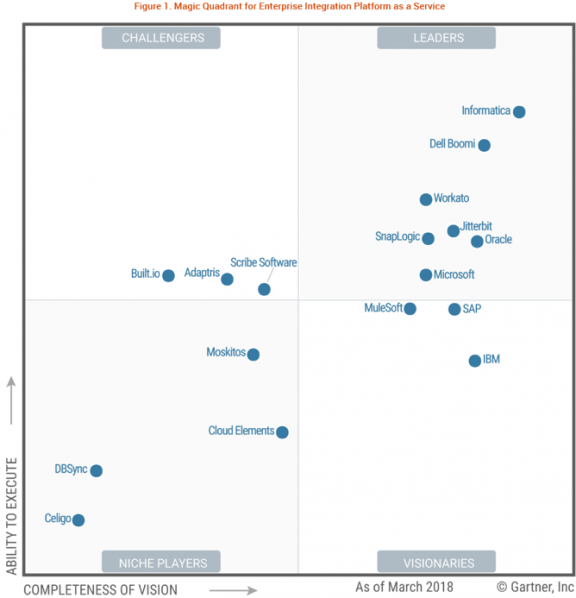The increasing shift from on-premise applications to a hybrid of on-premise and Software-as-a-Service (SaaS) applications, has introduced significant complexities for organisations attempting to simplify enterprise application integration. It has also presented a challenge for customers and technical consultants in preparing for the task of integration, as the tools available from Oracle have been multiplying since the introduction of Cloud. There is now a plethora of varied integration tools from Oracle, all of which serve different purposes.
This article discusses some examples of core integration tools currently available which enable integrations with Oracle Cloud Applications.

Out-of-the-Box Integration Tools
Oracle Cloud Applications come pre-packaged with a few generic integration tools to allow the customer to develop their own integrations.
A number of these tools are manual integration tools, intended for use by non-technical, line of business users:
- File Based Data Import (FBDI): Oracle provide a suite of structured spreadsheets to populate and save as a .csv. These then use a standard process to upload the file to the server and run further processes to transfer the data to the interface tables and import into the various applications. These tend to be more functional in nature and cover, for example, Import and Calculate Daily Rates and AutoInvoice Import.
- ADF Desktop Integration (ADFdi): These are part of the ADF framework that enables desktop integration with MS Excel spreadsheets to manage large volume data uploads into Cloud Applications. These are targeted more at technical developers.
Also pre-packaged, are tools which provide greater flexibility for technical developers to create custom integrations, or for use with integrating third party applications:
- BI Reporting/Analytics data: Enables data extraction and movement from the Cloud. There are four primary reporting tools which address different balance and transaction level reporting requirements:
- Financial Reporting Center
- Smart View (an MS Excel plug-in)
- Oracle Transactional Business Intelligence for Financials (OTBI)
- BI Publisher
- Web Services: This enables the use of SOAP/REST/XML protocols. The catalogue of web services allows publishing, discovery of, subscribing to, managing, running and securing APIs. Additionally, web service APIs enable developers to create unique custom integrations which are customer focused. However, these can be labour intensive, in terms of the initial development effort required.
These tools for data extraction and web services enable technical consultants to provide tailormade integration solutions specific to business needs.
Data Centric Oracle Integration Tools
Whilst the above methods are suited to regular movements of modest data volumes, Oracle also offers licensed integration tools for managing the movement of high volume data on the Cloud. These are more evolved tools which enable simpler and configurable integrations. However, as these tools are licensed, they come at a cost.
For moving large volumes of data, Oracle offers the following tools:
- GoldenGate Cloud Service: is a Cloud-based service for real-time data replication, which provides seamless data movement from varied sources and targets in real-time. GoldenGate captures transactional data changes in an extract file then moves it to the target server via process called Data Pump. Finally, the data is loaded on to the target database using a replication configuration. The entire process occurs with minimal latency and impact to the source and target systems
- Oracle Data Cloud Integrator Service (ODCIS): is a Cloud-based data integration product which delivers a high-performance bulk data movement and transformation tool. It provides an open integrated E-LT (extract, load and transform) architecture against which Oracle provides extended support for Cloud and Big Data solutions. It is also integrated closely with other Oracle Integration Cloud Service products, for end-to-end solutions.
Both tools serve as data centric solutions for Data Warehouses and high-volume data movement. ODCIS has the additional benefit of binding batch E-LT jobs and complex transformations. ODICS can be integrated with GoldenGate to utilise the advantages of E-LT and real-time data replication
Simpler User-Friendly Integration Tools
Whilst the data centric tools require technical expertise to integrate the solution, Oracle have also introduced a simpler technical tool for integrations with generic requirements. These enable line of business leads who have good application knowledge but less complex integration needs.
- Integration Cloud Service (ICS): Provides easier integration of different applications whether on-premise or SaaS. It delivers pre-built adapters that can be configured with little effort to provide a unified integration solution. ICS provides native connectivity to many Oracle SaaS offerings, with intuitive connectivity to many third-party applications through adapters. This is all without needing to write code or install and manage infrastructure or middleware.
- Oracle Integration Cloud Service (OICS): Provides a packaged version of ICS with additional tools;
- Visual Builder Cloud Service (VBCS): enables add-on forms to existing Oracle SaaS offerings.
- Process Cloud Service (PCS): tools with low code to build complex process workflows, actionable notifications and mobile apps.
- Insights: enabling business monitoring of real-time integrations in heterogeneous on-Cloud and on-premise environments.
Users have access to underlying infrastructure components such as Database, Events, Storage, Compute, etc.
- Autonomous Integration Cloud Service (OAICS): is a service provided by Oracle to fully support all integrations in OICS. However, users have no access to the underlying infrastructure components such as Database, Events, Storage, Compute, etc.
Selecting the Right Integration Tool
So, how do companies select the most appropriate integration tool? Below is a graphical illustration of where each of the tools fit depending on the type of integration required.

Since the inception of Cloud, Oracle has made great strides to becoming a dominant market player for cloud integrations, whilst still having strong competition from products like Dell Boomi and Informatica. Its unified offering in OICS and OAICS can provide a complete and simplified integration offering providing businesses with cost effective solutions. However, these tools are aimed at low code and quick delivery solutions and may not be suited to the creation of more complex integrations which require custom logic. Where organisations are required to create complex integration solutions, using the out-of-the-box integration tools (i.e. web services and data extracts), custom development may be better suited.
Summary
Oracle have a variety of tools to manage cloud integration, which serve different purposes to cater for the wide-ranging needs of the customer. Each tool has its strength and weaknesses which require to be analysed in selecting the best fit for any requirement.
The decision as to which tool is most appropriate from the suite of integration tools falls largely to carefully understanding the requirements of the organisation, considering data volumes, frequencies, complexity, data flows and transformations. Other considerations would include reviewing the skill set available to implement a specific integration, alongside the cost of delivering the requirements. Once all these factors are understood it is most likely the ideal solution will require multiple products be adopted.
In April 2018 Gartner elevated Oracle’s integration platform, as can be seen below.

Gartner’s 2018 “Magic Quadrant for Enterprise Integration Platform as a Service”
Get in touch
If you would like to discuss your options for data migrations and integration with Cloud Applications any further, then please get in touch.
Ritesh Patel
Senior Oracle Consultant
